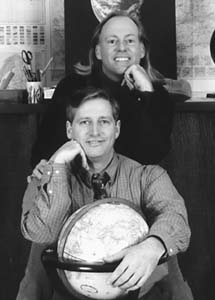Solar Souls
Sheri Batemon
Cinnabar puts Lonely Planet in orbit
By Daedalus Howell
FLASH. In the 16th century, astronomer Nicolaus Copernicus advanced the theory that the planets of our solar system revolve around the sun and not vice versa as theretofore believed. In related news, for one last weekend, in their heart-rending restaging of Steven Dietz's Lonely Planet at the Cinnabar Theater, actor-director Michael Fontaine and sole cast-mate Dwayne Stincelli advance the theory that emotional beings are compelled to orbit one another.
More than merely a reprise of Fontaine and Stincelli's 1996 Actors' Theatre production of the award-winning play, the duo's current Lonely Planet (performed under the auspices of the Quicksilver II Theater Company) proves itself vital, essential theater in the enduring era of AIDS. It is a true success.
Meet affable, mild-mannered Jody (admirably deployed by Stincelli), a practical 40-something--a man to whom the notion of a "known quantity" is a hair's breadth removed from rapture. Literally an amasser of "charted territory," Jody sells maps, a vocation aptly metaphoric of the demystification the character requires as he navigates his world--in which he is gay and is paralyzed by incertitude on the eve of his first AIDS test.
The test is so portentous to the staid map-seller that he grows increasingly agoraphobic and sequesters himself in his shop, maintaining contact with the outside world only through his lovingly erratic friend, Carl (a wondrously warm portrayal by Fontaine). Prone to unannounced visits and bombastic laments, Carl is the proverbial loose cannon--loaded, however, with concern for Jody and unseen others stalked by AIDS.
Beset by a sudden existential paroxysm, Carl begins to dutifully retrieve the chairs of friends who have died of AIDS and store them in Jody's shop. As countless chairs begin to throng the stage, what was initially an arresting and profound visual symbol of loss and bereavement becomes a veritable monument to those taken by the disease.
In time, Carl's entrances betoken the inevitable and doleful stockpiling of chairs and the memory of those they represent--a ponderous endeavor playwright Dietz elects to mitigate with such epigrammatic salves as Carl's characteristic line, "Irony is the penicillin of modern thought." The effect is at once wry and heartening and confirms that such coping strategies, though husked in cynicism, are in fact pragmatic and necessary.
Throughout the production, both actors maintain first-rate performances. Stincelli's Jody radiates warmth in deliberate pulses as, scene by scene, his icy reserve and psychic rigidity melt into the waterworks a play of this caliber is wont to turn on. Moreover, Stincelli conveys asides to the audience so effortlessly and with such a refreshing lack of actorly self-consciousness that one can hardly suppress the notion that he's not actually acting but simply being.
Likewise, Fontaine's Carl is a stirring amalgam of vulnerability and vigilance--a moving portrait of a man laboring under the duress of absolute calamity and striving to preserve, if not create, meaning as he collects his improbable chairs. Fontaine displays the uncanny ability to reveal the native soulfulness of his character without endangering his delightfully nervous pluck.
Similarly, as director, Fontaine manages to toe the work's seriocomic line without ensnaring himself in its myriad possibilities. Like the flagrant distortions forgiven in maps for purposes of navigation, Fontaine's interpretation suggests Jody and Carl's frequent fantastical musings are also an attempt to retain perspective.
Fontaine and Stincelli's immaculately designed set--replete with all things cartographic, including a glowing globe and countless packing tubes that all but waft must--provides the perfect forum for the characters' antics, shenanigans, and breakdowns. Aloysha Klebe's lighting expertly frames the play's scenes and on several occasions exhibits a particularly adept use of the spotlight to identify the singularity of the character's experience.
Lonely Planet is, in a word, stellar.
[ Sonoma County | MetroActive Central | Archives ]
Copyright © Metro Publishing Inc. Maintained by Boulevards New Media.
![]()
 Stellar: Michael Fontaine and Dwayne Stincelli in Lonely Planet.
Stellar: Michael Fontaine and Dwayne Stincelli in Lonely Planet.
Lonely Planet plays Thursday-Saturday, April 30-May 2, at 8 p.m. at the Cinnabar Theater, 3333 Petaluma Blvd. N., Petaluma. Tickets are $10-$14. 707/763-8920.
From the April 30-May 6, 1998 issue of the Sonoma County Independent.
![[MetroActive Stage]](/gifs/stage468.gif)